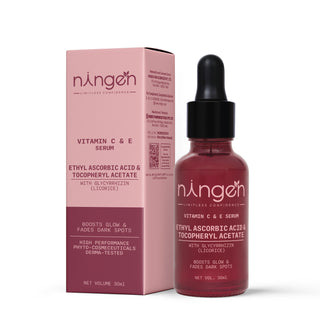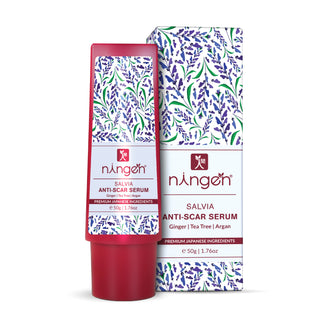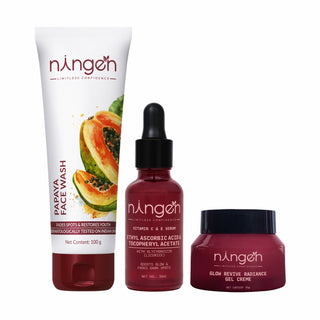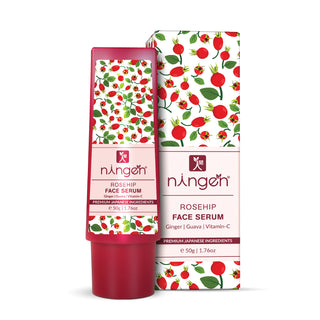In the pursuit of flawless skin, one ingredient stands out as a game-changer: Vitamin C serum.
Packed with antioxidants and skin-loving properties, it's the ultimate elixir for achieving a radiant, youthful complexion. Vitamin C serum perks up your skin, making it brighter, bouncier, and more resilient. It fights off dullness, smooths out texture, and keeps those pesky wrinkles at bay. Plus, it's like a shield against sun damage and helps fade those annoying dark spots. Total skin superhero vibes!
Join us as we unveil 13 benefits of Vitamin C serum for your face and skin.
In this Article;
- 13 Benefits of Vitamin C for Your Skin
- What is Vitamin C Serum?
- The Importance of Concentration in Vitamin C Products
- The Role of Other Active Ingredients in Vitamin C Serums
- Choosing the Right Vitamin C Serum for Your Skin Type
- Incorporating Vitamin C Serum into Your Skincare Routine
- The Correct Way to Apply Vitamin C Serum
- When to Apply Vitamin C Serum in Your Skincare Routine
- Pairing Vitamin C Serum with Other Skincare Products
- Common Skin Conditions Improved by Vitamin C Serum
- The Takeaway
- TL;DR(Too Long; Didn't Read)
- Frequently Asked Questions
13 Benefits of Vitamin C for Your Skin
Vitamin C serum offers a multitude of benefits for your skin. Here are some of its key effects:
- Brightens Skin: Vitamin C helps to fade dark spots, hyperpigmentation, and uneven skin tone, resulting in a brighter complexion.
- Boosts Collagen Production: It stimulates collagen synthesis, leading to firmer, more elastic skin and reducing the appearance of fine lines and wrinkles.
- Protects Against Sun Damage: Vitamin C acts as an antioxidant, neutralizing free radicals generated by UV exposure, thus reducing sun damage and premature aging.
- Evens Out Skin Tone: By inhibiting melanin production, Vitamin C helps to reduce the appearance of age spots, sun spots, and discoloration, leading to a more uniform skin tone.
- Improves Skin Texture: Its exfoliating properties promote cell turnover, resulting in smoother, softer skin texture.
- Hydrates Skin: Vitamin C helps to retain moisture in the skin, keeping it hydrated and plump.
- Reduces Inflammation: It has anti-inflammatory properties that can soothe irritated or inflamed skin, making it beneficial for conditions like acne or rosacea.
- Enhances Wound Healing: Vitamin C aids in the body's natural wound-healing process, helping to repair and regenerate damaged skin.
- Protects Against Environmental Damage: It provides a shield against environmental aggressors like pollution and harsh weather conditions, preserving the skin's health and vitality.
- Improves Skin Barrier Function: By strengthening the skin's barrier, Vitamin C helps to lock in moisture and protect against external irritants.
- Gives Radiant Glow: Regular use of Vitamin C serum can impart a radiant, healthy glow to the skin, leaving it looking refreshed and revitalized.
- Combats Signs of Aging: It targets multiple signs of aging, including wrinkles, fine lines, and sagging skin, for a more youthful appearance.
- Compatible with Other Skincare Ingredients: Vitamin C can be easily incorporated into your existing skincare routine and pairs well with other active ingredients like retinol and hyaluronic acid, enhancing their efficacy.
Note: read our other article to know what Vitamin C does for your skin.
What is Vitamin C Serum?
Vitamin C serum is a topical skincare product that delivers concentrated levels of vitamin C, also known as ascorbic acid, directly to the skin. It's designed to be easily absorbed and to provide potent antioxidant protection, boost collagen production, and reduce signs of aging. Serums are typically lightweight and can be used in conjunction with other skincare products to enhance your overall skincare routine.
Different Forms of Vitamin C in Skincare Products
Vitamin C can be found in various forms in skincare products. The most common include L-ascorbic acid, which is the purest form of vitamin C, sodium ascorbyl phosphate, and magnesium ascorbyl phosphate, which are more stable and less irritating to the skin. Each form has its own set of benefits and is chosen for use in products based on the desired outcome and skin type compatibility.
The Importance of Concentration in Vitamin C Products
The efficacy of a vitamin C serum depends heavily on the concentration of the active ingredient. Typically, serums can contain anywhere from 5% to 20% vitamin C. A higher concentration may offer more potent benefits, but can also increase the risk of irritation for those with sensitive skin. It's crucial to find a concentration that your skin can tolerate well while still providing significant skincare benefits.
Note: Do you know why Vitamin C is good for your body? Click on the link.
The Role of Other Active Ingredients in Vitamin C Serums
Many vitamin C serums are formulated with additional active ingredients that complement the effects of vitamin C. For instance, ingredients like ferulic acid and vitamin E can increase the serum's antioxidant properties. Hyaluronic acid is also commonly included to provide moisturizing benefits. These ingredients harmonize with vitamin C to protect, repair, and nourish the skin more effectively.
Why L-Ascorbic Acid is Considered the Gold Standard
L-ascorbic acid is considered the gold standard form of vitamin C in skincare because of its potent antioxidant properties and its ability to stimulate collagen synthesis effectively. It has been the most researched and has consistently demonstrated the ability to penetrate the skin barrier and deliver benefits directly to the skin cells, making it a preferred choice for many high-quality vitamin C serums.
The Benefits of Ferulic Acid in Vitamin C Serums
Ferulic acid is a plant-based antioxidant that, when combined with vitamin C, can stabilize the formula and enhance its protective effects. This synergy not only extends the shelf life of the vitamin C serum but also boosts its ability to fend off environmental stressors like UV rays and pollution. As a result, serums containing ferulic acid can help to combat the signs of aging more robustly.
Alternative Forms of Vitamin C: Ascorbic Acid and Magnesium Ascorbyl Phosphate
Aside from L-ascorbic acid, other forms like ascorbic acid and magnesium ascorbyl phosphate are also used in vitamin C serums.
Ascorbic acid is similar to L-ascorbic acid but may vary in terms of pH levels and stability. Magnesium ascorbyl phosphate is a water-soluble derivative that is less potent but more stable and better suited for sensitive skin types or those new to using vitamin C in their skincare regimen.
By making informed choices about the type and concentration of vitamin C serum you use, and understanding how it interacts with other active ingredients, you can optimize the benefits for your skin and maintain its health and beauty.
Choosing the Right Vitamin C Serum for Your Skin Type
When selecting a vitamin C serum suitable for your skin, it's essential to consider your specific skin type.
Dry skin may benefit from serums with hydrating ingredients like hyaluronic acid, while oily skin might prefer a lighter, more water-based formula.
For combination skin, look for a balanced serum that addresses both oiliness and dryness. If your skin is normal, you have the flexibility to choose from a wide range of vitamin C products. Sensitive skin types should proceed with caution, opting for lower concentrations and serums infused with soothing components.
|
Skin Type |
Suggested Form of Vitamin C |
Additional Ingredient Suggestions |
|
Dry |
Ascorbic acid |
Hyaluronic acid, Vitamin E |
|
Oily |
Sodium ascorbyl phosphate |
Niacinamide, Salicylic acid |
|
Combination |
L-ascorbic acid |
Ferulic acid, Hyaluronic acid |
|
Normal |
Any form, concentration personal preference |
Any preferred active ingredients |
|
Sensitive |
Magnesium ascorbyl phosphate |
Aloe vera, Ceramides |
Considerations for Sensitive Skin
For individuals with sensitive skin, vitamin C serums can sometimes provoke irritation. To minimize this risk, choose a serum with a lower concentration of vitamin C, ideally around 5-10%. Serums containing magnesium ascorbyl phosphate may be more suitable as they are gentler on the skin. It is also essential to seek out serums that are free from fragrances, alcohol, and other potential irritants. Before fully integrating it into your skincare routine, perform a patch test to ensure compatibility with your skin.
Addressing Specific Skin Concerns with Vitamin C Serums
Vitamin C serums can be tailored to various skin concerns. To correct uneven skin tone, look for serums that combine vitamin C with ingredients that target melanin production, such as licorice root extract. If aging skin is a concern, focus on products boasting high concentrations of L-ascorbic acid to support collagen production. For those prone to acne, serums with added anti-inflammatory properties can help manage breakouts. Always consult with a dermatologist for a recommendation based on your unique skin condition.
Oily Skin and Vitamin C Serums: Dos and Don'ts
For those with oily skin, vitamin C serums can provide excellent benefits without contributing to excess oil.
Do:
- Opt for serums with a gel-like consistency that absorbs quickly.
- Look for additional oil-controlling ingredients such as zinc or niacinamide.
- Select non-comedogenic formulas to prevent blocked pores.
Don't:
- Use serums with heavy, oily bases.
- Over-apply, as this can lead to skin congestion.
- Neglect to patch test, especially if you have a history of sensitivity.
Remember, integrating vitamin C serums into your routine should be a gradual process, allowing your skin to adjust to the active ingredients. Observing these considerations will help you reap the full benefits of vitamin C without unwanted side effects.
Incorporating Vitamin C Serum into Your Skincare Routine
To effectively integrate Vitamin C serum into your skincare routine, consistency, and compatibility with existing products are key. Begin by choosing a Vitamin C serum tailored to your skin type and concerns, considering the elements from the provided table. Start by using the serum a few times a week and gradually increase to daily use as your skin adapts.
- Introduce It Gradually: When incorporating a new skincare product, especially one with active ingredients like vitamin C, it's crucial to introduce it gradually to allow your skin to acclimate. Start by using the serum a few times a week, gradually increasing the frequency as your skin adjusts.
- Apply it Correctly: To reap the full benefits of vitamin C serum, proper application is key. After cleansing and toning your skin, apply a few drops of the serum onto your fingertips and gently massage it onto your face and neck. Allow it to absorb fully before proceeding with moisturizer and sunscreen during the day.
- Pair it with Complementary Products: Vitamin C serum can complement other skincare products in your routine, enhancing their efficacy. Consider pairing it with hyaluronic acid for added hydration or niacinamide for improved skin texture and clarity.
- Don't Forget Sun Protection: While vitamin C offers antioxidant properties that help protect the skin from environmental damage, it's not a substitute for sunscreen. Always follow up with a broad-spectrum sunscreen with SPF 30 or higher during the day to shield your skin from harmful UV rays.
- Be Consistent: Consistency is key when it comes to skincare. Incorporating vitamin C serum into your daily routine and sticking to it over time can yield noticeable results. Patience is essential, as it may take several weeks to see significant improvements in your skin.
- Adjust as Needed: Pay attention to how your skin responds to the vitamin C serum. If you experience any irritation or sensitivity, scale back on the frequency of use or opt for a lower concentration. Likewise, if you're not seeing the desired results, consider consulting a dermatologist for personalized recommendations.
It's essential to note that while Vitamin C is suitable for most skin types, the concentration of Vitamin C and the formula's pH level play significant roles in efficacy and tolerance. A lower concentration is advisable for sensitive skin, and a serum with a pH below 3.5 is ideal for optimal absorption. Be patient with the process, as benefits like improved texture and brightness develop over time.
The Correct Way to Apply Vitamin C Serum
Cleanse your skin thoroughly before applying your Vitamin C serum to ensure the product can penetrate effectively. Dispense a few drops of the serum into the palm of your hand, and using your fingertips, apply it to your face and neck. Gently pat and press the serum into the skin—don't rub vigorously, as this can cause irritation.
Remember to apply the serum when your skin is still slightly damp to aid absorption. It's crucial not to mix directly with certain active ingredients, such as AHAs, BHAs, or retinol, which could affect the serum's integrity, potentially leading to irritation.

When to Apply Vitamin C Serum in Your Skincare Routine
Vitamin C serum is most effective when applied to cleansed skin. It should be one of the first products you use after cleansing and toning. The sequence goes:
- Cleanser
- Toner (if used)
- Vitamin C serum
- Moisturizer
- Sunscreen (during the day)
In the morning, Vitamin C serum provides a layer of defense against oxidative stress from UV rays and pollution. If you're using it twice a day, follow the same order in your evening routine, substituting sunscreen with a nighttime moisturizer or treatment.
Pairing Vitamin C Serum with Other Skincare Products
Pairing your Vitamin C serum with the right products can enhance its benefits. Vitamin C works well with sunscreen, as it boosts the efficacy of the SPF, helping to better protect the skin from sun damage. At night, combining Vitamin C with a moisturizer containing hyaluronic acid can hydrate and plump the skin, as Vitamin C's brightening effects work in synergy with the moisture-binding properties of hyaluronic acid.
Avoid using Vitamin C simultaneously with products containing benzoyl peroxide, as they can cancel out each other's effects. If you use products with retinol, alternate their application between morning and night to avoid potential irritation. Always consult with a skincare professional to tailor a regimen that addresses your individual needs and to ensure that products are layered correctly for maximum efficacy.
Common Skin Conditions Improved by Vitamin C Serum
Vitamin C serum is renowned for its transformational benefits on various skin conditions, serving as a versatile addition to skincare routines. With its potent antioxidant properties, Vitamin C serum addresses concerns from uneven skin tone to premature aging. By promoting collagen production, it aids in diminishing the appearance of fine lines and improves skin elasticity. Regular use of vitamin C serum can help reduce redness and inflammation, making it beneficial for conditions like rosacea. Furthermore, it contributes to skin hydration and can strengthen the skin's barrier, which is particularly helpful for those with dry or sensitive skin. Incorporating this powerful topical vitamin into daily regimens assists in maintaining a radiant, healthy complexion across diverse skin types.
Sun Damage and the Benefits of Vitamin C Serum
One of the remarkable abilities of Vitamin C serum is to mitigate the effects of sun damage — a leading cause of premature aging. UV rays can trigger free radical formation, leading to oxidative stress that harms the skin. Vitamin C serum, as a powerful antioxidant, neutralizes these free radicals and supports the skin’s natural regeneration process, helping to repair damaged cells. Additionally, it helps fade hyperpigmentation and brown spots, which are indicators of sun exposure. By enhancing the protective barrier of the skin, Vitamin C serum complements the use of sunscreen, amplifying defense against future UV-induced damage.
Combating Radical Damage with Vitamin C Serum
Aside from sun exposure, environmental pollutants and lifestyle factors contribute to radical damage — the unstable molecules that accelerate skin aging. Vitamin C serum acts as a shield against these pollutants and stressors by donating electrons to neutralize harmful free radicals. This process prevents the breakdown of collagen and preserves the skin's overall health and appearance. The consistent application of Vitamin C serum also bolsters skin resiliency, ensuring a stronger, more fortified complexion that is better able to withstand environmental assaults.
Melasma and Vitamin C Serum
Melasma, characterized by dark, discolored patches on the skin, often results from hormonal changes and sun exposure. Vitamin C serum combats this condition by inhibiting melanin production, the pigment responsible for skin coloration. This topical vitamin can gradually fade these dark spots and lead to a more uniform skin tone. Moreover, its anti-inflammatory properties help to calm the skin, which can prevent the exacerbation of melasma. While Vitamin C serum is a non-invasive treatment option for melasma, consistency is crucial for seeing meaningful results.
Acne and Vitamin C Serum: Can it Help?
Acne-prone individuals may find a friend in Vitamin C serum. While it’s not a direct treatment for acne, the serum's antibacterial properties can help prevent mild acne by keeping the skin clean and reducing inflammation. It can also work to heal acne scars and post-inflammatory hyperpigmentation by boosting skin cell turnover and collagen synthesis — processes vital for skin repair and scar fading. For those with oily skin, selecting a Vitamin C serum with a lighter, non-comedogenic formulation can ensure benefits without clogging pores. Always perform a patch test first, especially for those with sensitive skin, to minimize the risk of irritation.
Explore our recommended product selection for Vitamin C in the section below.
The Takeaway
Hope you found the article Integrating vitamin C serum into your skincare routine can truly transform the health and appearance of your skin. With its myriad benefits, including brightening, evening out skin tone, promoting collagen production, and protecting against environmental damage, vitamin C serum is a powerhouse ingredient for achieving a radiant complexion. By understanding how to choose the right product, applying it correctly, and being consistent in your skincare regimen, you can harness the full potential of vitamin C serum and unlock the secret to glowing, healthy skin. So why wait?
"Harness the power of vitamin C and watch your skin bloom like a radiant flower."
Quick View:
Incorporating vitamin C serum into your skincare routine can revolutionize your skin health. Its numerous benefits include brightening, evening out skin tone, boosting collagen production, and protecting against environmental damage. By selecting the right product, applying it correctly, and maintaining consistency, you can unleash the full potential of vitamin C serum for glowing, healthy skin. So, why wait? Embrace the transformative power of vitamin C and watch your skin radiate with beauty.
Frequently Asked Questions
Question: What is Vitamin C serum, and how does it benefit the skin?
Vitamin C serum is a topical skincare product infused with concentrated levels of vitamin C, known for its antioxidant properties. It benefits the skin by brightening complexion, boosting collagen production, and protecting against environmental damage.
Question: Who can benefit from using Vitamin C serum?
Virtually anyone can benefit from using Vitamin C serum, regardless of skin type or age. Its versatile properties make it suitable for those looking to address concerns such as dullness, fine lines, and uneven skin tone.
Question: How often should I use Vitamin C serum?
Vitamin C serum can typically be used once or twice daily, depending on individual skin tolerance. Begin with a lower frequency, such as every other day, and gradually increase usage as your skin adjusts.
Question: Can I use Vitamin C serum alongside other skincare products?
Yes, Vitamin C serum can be easily incorporated into your existing skincare routine. It pairs well with other active ingredients like hyaluronic acid and retinol, enhancing their efficacy.
Question: At what age should I start using Vitamin C serum?
There is no specific age requirement for starting Vitamin C serum. It can be introduced into a skincare routine whenever desired, whether to address specific concerns or as a preventive measure against premature aging.
Question: Can Vitamin C serum help with acne-prone skin?
While not a direct treatment for acne, Vitamin C serum's antibacterial properties can help prevent mild acne by keeping the skin clean and reducing inflammation. It can also aid in healing acne scars and post-inflammatory hyperpigmentation.
Question: Is there a specific time of day to apply Vitamin C serum?
Vitamin C serum is most effective when applied to cleansed skin. It can be used in both morning and evening skincare routines, typically after cleansing and toning and before moisturizing.
Question: Can I layer Vitamin C serum with sunscreen?
Yes, Vitamin C serum can be layered with sunscreen. In fact, it can enhance the efficacy of sunscreen by boosting the SPF and providing additional protection against UV-induced damage.
Question: How long does it take to see results from using Vitamin C serum?
Results from using Vitamin C serum may vary depending on individual skin types and concerns. While some may notice improvements in skin texture and brightness within a few weeks, it may take longer to see significant changes in other areas such as hyperpigmentation or fine lines.
Question: Are there any side effects associated with using Vitamin C serum?
While Vitamin C serum is generally well-tolerated, some individuals may experience mild irritation, especially when first incorporating it into their routine or when using higher concentrations. It's essential to perform a patch test and start with a lower concentration to assess tolerance.











